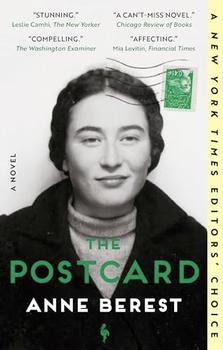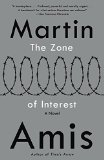Summary | Excerpt | Reviews | Beyond the book | Read-Alikes | Genres & Themes | Author Bio

A Novel of World War II
by Hubert MingarelliHoly smokes! I sat in stunned silence for a long while after finishing the final page of Hubert Mingarelli's potent, intimate novel about three Nazi soldiers out in the freezing Polish winter hunting for Jews to take back to their camp for execution. So many things went through my head.
Translated from French and narrated in the first person by one of the soldiers, this spare, slender (138p) book is mighty. I waited a long time for A Meal in Winter to arrive and was quite certain I wanted to read it in spite of the fact that I knew I was not going to like the men. They are part of Hitler's genocide machine after all. But there is nothing to learn from reading only about people we like. And what's the point if not to learn?
The three soldiers – Bauer, Emmerich and the narrator – are reservists, not regular army. Two are unmarried and one, Bauer, is married with a young son. Mingarelli brings them to us as supremely mundane types – plain speaking, uncomplicated, even simple. The monstrosity of their assigned task – killing human beings as they lie helpless in the snow – gives them nightmares, and the prospect of having to carry it out makes them plead illness just to escape it. When they are told there will be more Jews arriving the next day, the three men wait for their CO (a proper soldier) to leave the camp so they can appeal to his superior – also a reservist, a fabric salesman in civilian life. They ask him if they may spend the next day hunting more Jews, a job that will take them away from the "shootings" for one day anyway.
They leave in the morning, before the kitchen even opens for breakfast, outfitted with only meager rations. It is bitter cold. "The dawning of the new day was like a portent. It was like leaving a place we hated. We stopped to smoke. Around us was nothing but vast fields. The wind had made waves in the snow, sculpting long, regular shapes that had long since been frozen by the cold. We looked around, and it was as if we were surrounded by a white sea. It was the same up in the sky." Bleakness pervades every step of their journey.
Eventually they find a young Jew holed up in a cave of snow. He's wearing a woolen cap with a snowflake embroidered on it. The narrator immediately hates him:
Because if you want to know what tormented me, and torments me to this day, it's seeing that kind of thing on the clothes of the Jews we're going to kill; a piece of embroidery, coloured buttons, a ribbon in the hair. I was always pierced by those thoughtful maternal displays of tenderness…[I]n that moment…I suffered for the mothers.
Finally the narrator confesses, "And then, because of this suffering they caused me, I hated them too. And the more I suffered for them, the more I hated them." There, in this naked confession, Mingarelli offers a key that opens the lock on how one human being, responding to orders from an authority he has no control over, can carry out the most heinous acts. The words, the misplaced hatred, the glimpse into the very heart of darkness chilled me to the bone as thoroughly as that frigid Polish countryside chilled these men.
Though brief, A Meal in Winter is neither a fast, nor easy read. Mingarelli touches on so many inconsistencies within the human psyche, and so much cognitive dissonance. He explores how very treacherous the world is due to longstanding, yet misguided, ideals of masculinity and authority. The story inspires questions as to whether these ideals are outmoded and at odds with a civilized, modern society. The truths Mingarelli writes about are still too relevant for comfort. Read this at risk of Emmerich, Bauer and their unnamed friend haunting you for days, maybe weeks. But read this.
![]() This review was originally published in The BookBrowse Review in August 2016, and has been updated for the
October 2018 edition.
Click here to go to this issue.
This review was originally published in The BookBrowse Review in August 2016, and has been updated for the
October 2018 edition.
Click here to go to this issue.

If you liked A Meal in Winter, try these:

by Anne Berest
Published 2024
Anne Berest's The Postcard is among the most acclaimed and beloved French novels of recent years. Luminous and gripping to the very last page, it is an enthralling investigation into family secrets, a poignant tale of mothers and daughters, and a vivid portrait of twentieth-century Parisian intellectual and artistic life.

by Martin Amis
Published 2015
Powered by both wit and compassion, and in characteristically vivid prose, Martin Amis's unforgettable new novel excavates the depths and contradictions of the human soul.
Your guide toexceptional books
BookBrowse seeks out and recommends the best in contemporary fiction and nonfiction—books that not only engage and entertain but also deepen our understanding of ourselves and the world around us.